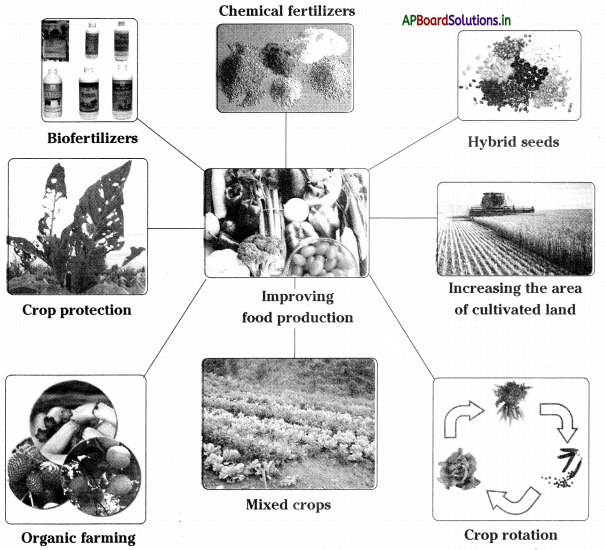Students can go through AP State Board 9th Class Biology Notes Chapter 8 Challenges in Improving Agricultural Products to understand and remember the concept easily.
AP State Board Syllabus 9th Class Biology Notes Chapter 8 Challenges in Improving Agricultural Products
→ Increasing food production in proportion to the increasing population is a big challenge for our country.
→ The production of a crop depends on
- the kind of seeds planted,
- the properties of the soil,
- the availability and proper application of irrigation and fertilizers,
- the weather, controlling insect attacks,
- the growth of weeds and so on.
→ Alternating crops preserve soil fertility.
→ Producing a variety of crops, as well as an increase in production, can be possible in a mixed crop system.
→ Irrigation plays an important role in increasing crop production.
→ A plant uses only 0.1 per cent of the water it absorbs to form carbohydrates.
→ Only the nutrient that dissolves in water is absorbed by the roots of the plant
→ Hybridization methods and genetic engineering methods enables us to bring desirable characters in seeds.
→ Transpiration and absorption of water occur through stomata.
→ Macronutrients are required in large quantities by plants. e.g.: Nitrogen, Phosphorous and Potassium.
→ Micronutrients are required in small quantities by plants. e.g.: Iron, Boran, Manganese, Zinc etc.
![]()
→ Agriculture officers advise farmers to cultivate dryland crops in fewer water areas.
→ Leguminous plants with root nodules supply nitrogen to the plant
→ Organic manure is produced by decaying plant and animal wastes.
→ Nutrients are replenished with crop rotation, adding organic manure or chemical fertilizers.
→ Green manure crops are grown so that they can be ploughed back into the soil
→ Biofertilizers synthesise nutrients from the environment or from soil to plants.
→ Green leaf manure can be prepared by using any plant leaves.
→ Soil testing centres give us knowledge about the soil
→ In organic farming, farmers use natural manures and natural pest-controlling methods.
→ Humus and water holding capacity are increased in the soil by applying natural manure.
→ Friendly insects control harmful insects.
![]()
→ Over usage of insecticides, fungicides, weedicides, pesticides lead to soil pollution, water pollution and hazardous to biodiversity.
→ Food Chain: Describes the linear sequence of organisms which represent their prey-predator relationship in the ecosystem.
→ Ecology: It ¡s the scientific study ¡n which plants, animals and people are related to each other and the environment.
→ Irrigation: To supply land or crops with water.
→ Kharif Crop: Crop refers to the planting, cultivation and harvesting of any domesticated plant sown in the rainy (monsoon) season.
E.g.: Paddy, Sugarcane, Maize etc.
→ Mixed Crops: Cultivation of more than one crop in the same field.
→ Rabi Crop: Agricultural crops sown in winter and harvested in the summer season. E.g.: Wheat, barley, sesame etc.
→ Fertilizers: Substance that ¡s applied to increase soil fertility and plant growth. May be organic or inorganic.
![]()
→ Macronutrients: Nutrients required ¡n large quantities by plants.
E.g.: Nitrogen, Phosphorous and Potassium.
→ Micronutrients: Nutrients required in small quantities by plants.
E.g.: Iron, Manganese, Boron, Zinc, Copper, Molybdenum etc.
→ Crop rotation: It is the process ¡n which one crop is followed by another crop on an agricultural field.
E.g.: After cultivation of Paddy, Black gram or Groundnut has to be grown followed by paddy again.
→ Replenish: To fill something again put new supplies into something. Soil testing centre: Tests the soil and give us knowledge about the soil.
→ Soil testing centre: Tests the soil and give us knowledge about the soil.
→ Synthetic pyrethroids: Chemicals used to control pests on crops.
E. g.: Pesticides, insecticides.
→ Biofertilizers: Fertilizers synthesized by microorganisms from the environment or from soil to plants.
→ Indigenous: Native, not foreign.
→ Insecticides: Chemicals used to kill insects.
→ Fungicides: Chemicals used to kill fungi.
→ Weedicides: Chemicals used to kill weeds.
![]()
→ Herbicides: Chemicals used to kill herbs.
→ Predatory insects: Insects that kill and eat insects.
→ Bacteria: Unicellular microorganisms reproduce by binary fission.
→ Immunity: Resistance developed against chemicals or things or animals. Stomata: Microscopic holes present in the epidermis of the leaf, helps in transpiration.
→ Carbohydrate: It ¡s an organic compound that consists only of carbon, hydrogen and oxygen. A major food source.
→ Bacterial culture: the initial step in studying morphology and identification of bacteria ¡n the disease process.
→ Mixed Crops: More than one crop ¡s cultivated ¡n the same field.
→ Organic farming: In this type of farming farmers use natural manures and natural pest-controlling methods. Crop rotation, mixed crops are also practised.
→ Vermicompost: It is the product or process of composting using worms usually earthworms.
→ Ingredients: A component part, constituent.
→ Watershed: A ridge of land that separates two adjacent river systems. A watershed is a basin-like landform defined by high points and ridgelines that descend into lower elevations and stream valleys.
→ Weeds: Other plants grow in afield along with the crop. These plants are called weeds.
![]()
→ Irrigated farming: Supplying water to land or crops is called irrigated farming.
→ Unirrigated farming: A farming that does not supply water to land or crops is called unirrigated forming.

→ Dr M.S.Swaminathan 7th August 1924:
- Dr M.S.Swaminathan is an Indian scientist doing his research in the agricultural industry.
- He is known as the fat her of the Green Revolution in India.
- He had contributed to the development high yielding varieties of wheat in India.
- From 1972 to 1979 he was director-general of the Indian Council of Agricultural Research (ICAR) and was the minister of Agriculture from 1979 to 1980.
- He served as director-general of the International Rice Research Institute (1982-88) at Manila.
- He is the founder and chairman of the M.S. Swaminathan Research Foundation and striving to rid the world of hunger and poverty.